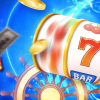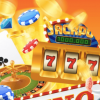Это серьёзная и актуальная проблема для многих игроков сегодня. Названий может быть много: игровая зависимость, патологическая склонность к азартным развлечениям, компульсивная игра, лудомания и т.д. Игроки могут называть его по-разному, но суть не меняется. Азартные игры приносят всё больше проблем, но человек не может остановиться.
Азартные игры могут не только дарить удовольствие, но и крайне отрицательно влиять на жизнь игроков. На этой странице вы найдёте информацию об игровой зависимости. Если у вас есть подозрения на её наличие, обязательно познакомьтесь с ней.
Содержание
- Игровая зависимость – определение и суть.
- Стадии развития игровой зависимости.
- Симптомы и признаки зависимости.
- Как диагностировать зависимость у себя?
- Что делать с игровой зависимостью?
Что такое – игровая зависимость?
Лудомания – это непреодолимое желание играть. Человек, страдающий игровой зависимостью, понимает, что нужно остановиться, и осознаёт негативные последствия. Но не может прекратить играть. Лудоманы играют даже себе во вред, или когда хотят остановиться.
Зависимость от азартных игр не всегда связана с количеством времени в онлайн казино или суммой ставок. Ваше игровое поведение начинает влиять на личную жизнь, а также на жизни всех окружающих. Тем не менее, чаще всего лудоманы постоянно играют в казино и ставят очень больше суммы.
Как изменялся термин «игровая зависимость»?
Лудомания известна очень давно. Однако лишь недавно она была признана болезнью на официальном уровне. Термин «компульсивная игра» используется до сих, так как Американская психиатрическая ассоциация долгое время считала её нарушением контроля над побеждениями.
Тем не менее, в 2013 году вышло пятое издание Диагностико-статистического руководства по психиатрическим болезням. И в нём игровая зависимость признана болезнью. При этом у неё очень много общего с зависимостью наркотической. Дело в том, что зависимые игроки (как и наркоманы) постоянно стараются стимулировать центры вознаграждения мозга.
Признание игровой зависимости болезнью очень важно. Это позволяет специалистам внимательнее относиться к пациентам и грамотно выбирать метод лечения. Больше информации вы можете найти на нашем сайте в материале о способах лечения игровой зависимости.
Развитие и изменение игровой зависимости у игрока
Лудомания – это постоянно меняющееся состояние. Её проявления могут меняться, а стадии изменений цикличны. Есть две основных модели развития зависимости от азартных игр. Они помогут понять, что чувствуют люди, которые страдают от игромании.
Эти знания помогут каждому игроку прислушаться к себе, увидеть своё состояние и понять, как зависимость влияет на жизнь близких и друзей.
Три этапа игровой зависимости
Эти стадии описал Робрет Кластер в схеме компульсивной игры. О трёх стадиях выздоровления вы можете прочитать в статье про лечение игровой зависимости.
Стадия выигрышей
Чаще всего формирование зависимости начинается с выигрыша. Он может быть крупным или небольшим. Но он резко подогревает интерес и азарт у игрока. Это формирует патологическое увлечение азартными играми.
После нескольких первых выигрышей пользователь начинает играть больше и чаще. Он мечтает об очень больших выигрышах. И если сначала будет просто интересно и увлекательно играть в онлайн казино, то потом вы начнёте получать удовольствие от выигрышей. И это ведёт к формированию зависимости и одержимости.
На стадии выигрышей азартные игры не вызывают тревогу у игроков или близких им людей. Они остаются развлечением. Чаще всего пользователи собираются в группы для совместной игры.
Стадия проигрышей
Никто не играет в онлайн казино в бесконечный плюс. Стадия выигрышей заканчивается, и начинается стадия проигрышей. Игрок начинает проводить в онлайн казино всё больше времени. При этом игра проходит в одиночестве. Из-за постоянных проигрышей начинают появляться первые проблемы.
Надо уточнить, что азартные игры вызывают проблемы не только из-за проигрыша денег. Меняется личность игрока и его отношение к окружающему миру. Даже на стадии выигрышей проявляются некоторые негативные симптомы.
Ещё одной проблемой становится отсутствие у пользователя денег на игру. Излишнее увлечение онлайн казино в перспективе всегда приводит к разорению. На стадии проигрышей игроки часто берут в долг или ищут другие пути поиска денег. Накапливаются долги, а вернуть их становится всё сложнее.
Стадия отчаяния
Это одна из самых сложных стадий для человека и его окружающих. Игровая зависимость принимает самую серьёзную форму. Некоторые игроки в таких случаях могут пойти на преступления, чтобы найти деньги на продолжение игры. При этом очень многие люди мучаются совестью и бояться. Они понимают совершённые ошибки и толком не представляют, как можно вернуться к прежнему образу жизни.
Патологическое увлечение гемблингом начинает всё сильнее влиять на работу и жизнь человека. Многие лудоманы при этом склонны винить в своих неудачах и формировании зависимости окружающих. Не каждый может чётко осознать свои ошибки.
В конце стадии отчаяния начинается этап, на котором игроки впадают в состояние безысходности. Если при этом нет денег на игру, то могут проявиться симптомы ломки. Из-за этого игроки иногда начинают использовать алкоголь и наркотики, чтобы заглушить негативные эмоции. Часто такое поведение может привести к эмоциональному срыву. Далее некоторые из них задумываются о самоубийстве.
Циклы и повторяемость игровой зависимости
Три стадии зависимости происходят линейно, одна за другой. То есть игрок постепенно погружается в зависимость всё глубже. Но при этом лудомания может проявляться не сразу, а циклически.
В таком случае цикл зависимости состоит из 5 стадий:
- Триггер. Игрок сталкивается с чем-то, что побуждает его подумать об игре после долгого перерыва. Такой триггер может быть и внутренним, и внешним. То есть или эмоция (воспоминание), или что-то увиденное (например, реклама онлайн казино). При этом каждый раз триггеры могут быть разные.
- Сильное желание играть. После триггера появляется сильное желание играть в онлайн казино. Постепенно оно становится сильнее и сильнее, а потом игрок не может сопротивляться и срывается.
- Игровой эпизод. В этот момент человек начинает играть. Не важно, проигрывает он или выигрывает.
- Дальнейшая игра. После первого опыта новой игры, лудоман продолжает играть. Обычно его цель – отыграться или выиграть ещё больше.
- Остановка. В какой-то момент заканчиваются или деньги, или время. И тогда игрок останавливается.
Вернуться с этапа остановки на триггер игрок может в любой момент. И случается это достаточно часто. Если у человека есть игровая зависимость, то триггер будет срабатывать всегда. Такое может продолжаться бесконечно. По крайней мере, до тех пор, пока игрок не обратиться за помощью к специалисту.
Признаки зависимости от азартных игр
Азартные игры обязательно нужно считать проблемой, если игрок хочет остановиться, но не может этого сделать и продолжает играть. При этом патологическая зависимость негативно влияет на все стороны жизни человека.
Здесь мы приводим основные категории симптомов. Они будут разобраны ниже.
- Желание остановиться и проблемы с совестью после игры.
- Финансовые проблемы.
- Нарушения распределения времени.
- Проблемы на работе.
- Социальные проблемы.
- Проблемы с психикой и физическим здоровьем.
Проблемы с совестью и желание остановиться
Некоторые зависимые игроки понимают, что лудомания вредит им, и хотят остановиться. Но это желание слишком слабое, чтобы оно позволило остановиться. Этот симптом часто сопровождается другим признаком – угрызениями совести. Игроки осознают, что совершили ошибку, проиграли деньги и получили ещё больше проблем. Появляется чувство вины и несчастья.
То, что игроки возвращаются к играм, делающих их несчастными – это верный признак игровой зависимости.
Проблемы с деньгами
Крупные проигрыши – это ещё один распространённый признак лудомании. Это очевидно. Но последствия таких проблем могут быть гораздо серьёзнее. На ранних стадиях игроки хотят выигрывать. Они мечтают о джекпотах или постоянном заработке в онлайн казино. Это губительные иллюзии.
Дело в том, что игрок не может выиграть в долгой перспективе даже на лучших сайтах казино. Игроки всегда находятся в проигрышном положении. Разовые выигрыши помогают подсесть на азартные игры ещё больше. В итоге лудоманы пытаются отыграться до тех пор, пока не проиграют всё, что есть. А желание вернуть проигранное никуда не исчезает.
В итоге игроки начинают сокращать расходы на себя и семью. Вплоть до отказа от вещей первой необходимости. В какой-то момент лудоманы перестают платить за жильё, покупать еду и т.д. Всё уходит на депозиты в онлайн казино.
Ещё один признак – необходимость всё время увеличивать ставки для того, чтобы поддерживать желаемый уровень азарта. Если прежние ставки вам не приносят удовольствия, то стоит прислушаться к своему состоянию.
Далее игроманы пытаются занимать деньги у родственников и друзей, чтобы отыграться. В совсем безвыходной ситуации они могут пойти и на преступления.
Проблемы с распределением времени
Как только игровая зависимость начинает развиваться, она отнимает у игрока всё больше и больше времени. Патологическая лудомания ведёт к тому, что человек теряет всё.
Менее заметный признак – это постоянное увеличение времени игровых сессий. Это происходит, когда вы проводите за игрой больше, чем обычно. В итоге у вас не остаётся времени на работу, семью и хобби. Заядлые игроки не уделяют внимания ничему, кроме азартных игр. Более того, для них онлайн казино становится способом ухода от реальности и накопившихся проблем.
Трудности с работой
Кем бы не работал лудоман, но игровая зависимость будет отрицательно влиять на его профессиональные качества. Сначала – банально из-за неправильного распределения времени. Ещё одно негативный момент: потеря концентрации. Если вы думаете только об азартных играх, то не можете сосредоточиться на работе.
Очень часто игроки с зависимостью теряют интерес и амбиции на работе. Постепенно их перестаёт волновать что-либо, кроме минимального дохода для продолжения игры.
Проблемы с общением и другие социальные симптомы
По мере того, как развивается зависимость, человек утрачивает свою связь с друзьями, близкими и другими людьми. Восстановить отношения можно, но чем дольше игрок не борется со своей болезнью, тем труднее будет это делать.
Ещё одно негативное последствие лудомании – это утрата авторитета и репутации в целом. Когда окружающие узнают о вашей проблеме, то перестанут доверять и изменят своё отношение к вам. Отсюда выходит ещё один симптом: лудоманы врут о том, что у них есть проблема. С одной стороны, им стыдно в этом признаваться, с другой – они бояться потерять доступ к деньгам, необходимым для дальнейшей игры.
Проблемы с психикой и здоровьем
Лудомания – это поведенческая зависимость. Большинство симптомов связаны именно с психическим состоянием человека. Кроме выше указанных, есть ещё несколько признаков.
- Один из них – это страх. Он появляться сразу после проигрыша всех имевшихся денег. Так как страх – это очень сильная эмоция, он опасен для игрока. Из-за этого чувства лудоман может совершать совсем иррациональные поступки.
- Раздражительность – ещё один признак. Игроманы не любят, когда кто-то говорит с ними об их зависимости или азартных играх вообще. Поэтому они начинают раздражаться, если такое происходит. В целом, это только мешает борьбе с лудоманией.
- Расстройство сна проявляется из-за переживаний и раздражительности. Игрок с зависимостью становится беспокойным, часто не спит по ночам и думает только об онлайн казино. Это снижает общий уровень здоровья и самочувствия.
- Когда человек достигает игрового дна, с которого уже не видит выхода, он впадает в отчаяние. Если он уже потерял близких и друзей, деньги и даже имущество, то могут появляться мысли о суициде.
- Уход от реальных проблем в гемблинг – это следствие таких негативных эмоций. Лудоман пробует найти выход привычным путём, но такого «спасения» нет. Поэтому игроки с зависимостью часто теряют интерес к жизни и себе. Поэтому очень важно не допускать у себя развития болезни.
Ещё одним частым примером могут быть депрессии и тревожность. Они проявляться на фоне остальных переживаний и могут привести к очень большим проблемам. Поэтому крайне важно начинать бороться с зависимостью при первых же подозрениях на неё.
Как диагностировать зависимость у себя?
Понять, есть ли у вас игровая зависимость – очень и очень важно. Чем раньше вы её обнаружите, тем легче сможете с ней справиться. Есть несколько основных методов диагностики:
- Анкета «Анонимных игроманов».
- Метод от DSM-5.
- Прочие способы.
Анкета «Анонимных игроманов»
Это опросник, созданный одной из самых больших организаций помощи игрокам с зависимостью. «Анонимные игроманы» работают по всему миру.
Для прохождения опросника, нужно ответить на 20 вопросов «да» или «нет».
- Вы когда-нибудь пропускали работу или учебу ради азартных игр?
- Вы когда-нибудь чувствовали себя несчастным в личной жизни из-за гэмблинга?
- Пристрастие к азартным играм испортило вашу репутацию?
- Вы когда-нибудь испытывали угрызения совести после гэмблинга?
- Вы когда-нибудь играли в азартные игры с целью вернуть долги или решить другие финансовые проблемы?
- Вы стали менее амбициозным и эффективным из-за гэмблинга?
- После проигрыша вам хотелось вернуться как можно скорее и отыграться?
- После выигрыша вам хотелось вернуться и выиграть еще больше?
- Вы часто играли, пока не проигрывали все свои деньги?
- Вам когда-нибудь приходилось брать деньги в долг, чтобы сыграть в азартные игры?
- Вам когда-нибудь приходилось продавать что-либо из своего имущества, поскольку вам не на что было играть в азартные игры?
- Вам когда-нибудь было жалко тратить «деньги для гэмблинга» на покупку необходимых вещей и продуктов?
- Вы стали пренебрегать своим собственным благополучием или благополучием вашей семьи из-за гэмблинга?
- Вы когда-нибудь играли в азартные игры дольше, чем планировали?
- Вы когда-нибудь играли в азартные игры, чтобы забыть о заботах, проблемах, скуке, одиночестве, горе или потере?
- Вы когда-нибудь совершали или задумывались о совершении преступления, потому что у вас не было денег на гэмблинг?
- Вы когда-нибудь испытывали проблемы со сном из-за гэмблинга?
- У вас возникает желание играть в азартные игры, когда вы участвуете в спорах, разочарованы или расстроены?
- У вас когда-нибудь возникало желание отметить какое-либо радостное событие несколькими часами гэмблинга?
- Вы когда-нибудь задумывались о том, чтобы причинить себе вред или совершить самоубийство из-за гэмблинга?
Этот опросник доступен на сайте организации. По данным «Анонимных игроманов», лудоманы отвечают положительно на 7 или более вопросов из 20. Этот опросник поможет определить наличие признаков зависимости, но не заменяет помощи специалиста.
Метод DSM-5
Это наиболее распространённый официальный метод. Он описан в пятом издании Диагностико-статистического руководства по психиатрическим расстройствам. Какие критерии используются?
Постоянная и регулярная внутренняя необходимость играть в азартные игры. При этом в течение года у игрока проявляются от 4 или более клинически значимых признака:
- Желание увеличивать ставки для большего удовольствия.
- Раздражительность и беспокойство при попытках остановиться или сократить время игры.
- Постоянные и безуспешные попытки контролировать себе или бросить игру.
- Постоянные мысли об азартных играх и невозможность сосредоточиться на чём-то другом.
- Чувство подавленность (может дополняться тревогой, депрессией, беспомощностью и виной).
- Попытки отыграться через несколько дней после проигрыша.
- Ложь и попытки скрыть свою зависимость.
- Проблемы в отношениях с близкими, на работе и т.д.
- Перенесение вины на других людей из-за отсутствия денег.
Как определить уровень своей зависимости? Если у вас есть хотя бы 4 таких признака, то зависимость уже сформировалась. У неё могут быть три степени тяжести:
- Лёгкая (4-5 признаков).
- Средняя (6-7 признаков).
- Тяжёлая (8-9 признаков).
Также по DSM-5 можно разделять эпизодическую и устойчивую лудоманию.
- Устойчивая зависимость. В этом случае симптомы стабильно проявляются в течение нескольких лет.
- Эпизодическая зависимость. Игрок соответствует некоторым критериям, они проявляются больше одного раза. Но возникают периодами (1 раз в несколько месяцев).
Также зависимость может переходить в состояние ремиссии. По DSM-5 есть два вида:
- Ранняя ремиссия. Ни один из признаков лудомании не проявляет себя от 3 месяцев до 1 года.
- Устойчивая ремиссия. Ни один из признаков лудомании не проявляет себя более 1 года.
ВАЖНО: диагностика по DSM-5 проводится специалистами с профильным образованием. Вы можете проверить себя по ней, но после этого нужно обязательно обратиться за квалифицированной помощью.
Другие способы диагностики
Есть и другие варианты самодиагностики на предмет игровой зависимости. Для этого вы можете посетить сайты организаций, занимающихся помощью игрокам. Например, это могут быть порталы Gambling Therapy, GamCare или GamleAware.
H2: Что делать, если вы – лудоман?
Есть целый ряд методик, приёмов и готовых решений, которые помогут бороться с игровой зависимостью. Можно пользоваться телефонными горячими линиями, группами поддержки, услугами специалистов и центрами реабилитации.
Главное условие – понять и принять наличие зависимости и начать борьбу с ней как можно раньше. Хуже всего, если вы ничего не будете делать.
О том, как работать над собой, если у вас есть игровая зависимость, вы можете на нашем сайте. Для этого посетите страницу «Лечение игровой зависимости».

















